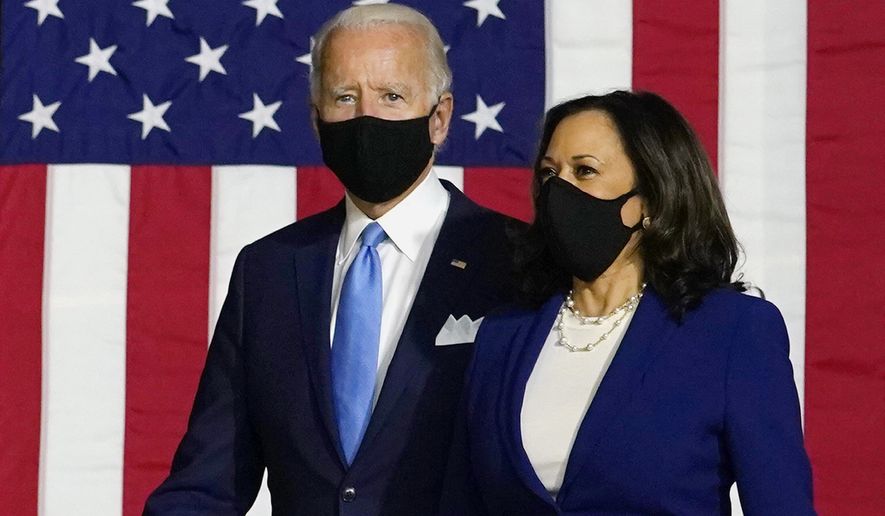OPINION:
Joe Biden has been successfully running a low-key and effective campaign to unseat President Trump in November. He is leading in most national polls. But there’s still a long way to go and a lot can happen. More importantly, to win in this inevitably close contest he’s going to have to persuade a majority of the nation’s 30 million small business owners to vote for him. Will they? Considering his policies that will ultimately affect their companies, that’s going to be a tall order.
Why? Because Mr. Biden’s policies are just not small business friendly.
Take the recent stimulus bill that’s currently being negotiated in Washington. Mr. Biden stands fully behind his party’s HEROES Act, which was passed by the House back in May. That legislation would — in addition to providing trillions of funding for state, local and educational programs — continue the federal government’s weekly $600 unemployment benefit through January 2021.
It would also require that employers provide paid leave under the Families First Coronavirus Act through the end of next year. Many of my small business clients, despite being able to take a future tax credit, are having to pay for these benefits now out of their already significantly-diminished cash reserves. They are also struggling to entice workers to return to jobs that often do not pay as much as the more generous compensation being offered under the federal unemployment program. This is not small business friendly. But Joe Biden supports it.
Donald Trump and the Republicans are taking a different approach to the stimulus. The Senate’s HEALS Act not only would reduce the federal unemployment stipend but provide liability coverage for businesses that are re-opening. This is an enormous concern to many small businesses because insurance will not cover lawsuits related to COVID-19.
Mr. Biden and his party have argued against this protection. They’ve also been mostly silent on continuing the very successful Paycheck Protection Program. This program, which was crafted by the Republican-controlled Senate, has been a lifesaver for millions of small businesses and the HEALS Act not only proposes another $190 billion round for needy small businesses but automatic forgiveness for smaller loans, which will save them time and money.
Clearly, the stimulus bills — both prior and pending — offered by President Trump and the Republicans are more small business friendly. Moreover, when you line up the presidential candidates’ positions on other major issues that affect small business, candidate Biden falls short just about every time.
Mr. Biden supports more than doubling the national minimum wage to $15 an hour. He wants to raise the minimum compensation eligible for overtime pay back to the Obama administration’s proposed levels of approximately $47,000 per year. He plans to overturn Mr. Trump’s business-friendly health care options such as Association Health Plans and either end or modify Health Care Reimbursement Accounts in order to fully restore the Affordable Care Act.
Mr. Biden is behind California’s recent anti-business legislation to force employers to classify more of their sub-contractors as employees and pay them added benefits. He wants to eliminate non-compete clauses in employment agreements so that workers can leave their jobs and more easily work at competitors. He counts the country’s labor unions among his biggest supporters.
Then, there are taxes.
Mr. Biden wants to restore the top individual tax rate to 39.6%. He is in favor of taxing capital gains at ordinary rates, which effectively raises the tax on capital gains. He intends to increase the corporate tax rate from its current rate of 21% to 28%. He wants to impose a 12.4% Social Security payroll tax for wages above $400,000.
For small business owners making more than $400,000, Mr. Biden wants to phase out the 2017 tax reform act’s Qualified Business Income Deduction under Section 199A, otherwise known as the “pass through deduction” which has been hugely popular among small business owners. Mr. Trump not only opposes these measures but has been pushing for reducing both payroll and capital gains taxes. The bottom line is that a Biden presidency would result in higher taxes for many small business owners.
Some argue that Mr. Biden’s proposals, particularly his tax proposals, would only impact the wealthiest of business owners and that argument is true. But these increases would also play a part in discouraging their investment and hiring.
You can also argue that while Mr. Trump’s policies are significantly more business friendly, his disruptive, erratic and oftentimes embarrassing behavior creates a level of confusion and uncertainty that produces other headaches — social unrest and trade disputes — for those of us trying to run our businesses peacefully and profitably. You would be correct in that argument too.
But in the end, small business owners tend to vote with their wallets. Up until the pandemic, they saw what a business-friendly administration can do both for the livelihoods of themselves and their employees. They also see the potentially negative financial impact that a Biden presidency could have on their profits. For Joe Biden, that’s a big problem heading into the final election year stretch.
• Gene Marks is a CPA and owner of The Marks Group, a technology and financial management consulting firm that specializes in small- and medium-sized companies.




Please read our comment policy before commenting.